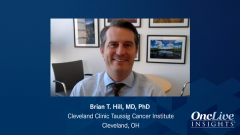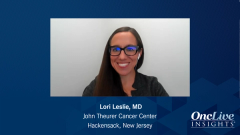
Considerations for Treatment Selection in the Third-Line R/R FL Setting
Dr Hill shares how he would have handled the patient case and discusses factors that contribute to treatment selection among third-line therapies for patients with R/R FL, including axicabtagene ciloleucel and other CAR T-cell therapies.
Episodes in this series

Dr. Brian T. Hill: So in the case that we reviewed, the patient was in his 70s. And when you see a short remission after R-CHOP and an even shorter remission after bendamustine-Rituxan with some evidence of accumulating immunosuppression with the requirement for multiple rounds of antibiotics due to infections, we start to get worried that we're running out of time and treatment options. There are some targeted therapies that can be used in the third line. We have data with lenalidomide and tazemetostat and others. But these are not necessarily definitive therapies and are gonna require ongoing treatment with potential side effects. The option of using CAR-T cell as third line is attractive because despite the toxicities, it's a one and done approach in which you have to typically be at a treatment center that is able to administer CAR-T cell therapy such as axicabtagene ciloleucel. And if you can get a patient referred for that, I think it's in this case was a very reasonable option in the third line.
So in the third line setting particularly if you've had these closing durations of remission, I think it's important to set your goals. Certainly, curative therapy is still a question whether you can achieve that with maneuvers such as allogeneic transplant, autologous transplant, or CAR-T cell therapy. So to say that we're shooting for a cure might be a little ambitious. So really I would say the goal is to improve overall survival regardless of whether we actually cure. And to achieve an improved overall survival and PFS, we really need effective treatment options. Because of the availability of CAR-T as well as targeted therapies, I think it's important to really have a consideration of what factors may influence your treatment selection. So certainly age and comorbidities would be high on the list. I don't think that it's a great approach to consider CAR-T someone in, to someone who's frail or in their late 80s or late 70s with significant comorbidities. But certainly for fit patients in their 70s or 60s, axi-cel is a very reasonable option. The other options as we alluded to include lenalidomide with rituximab or R2, tazemetostat. And there are still some availabilities of the PI3. There's some still availability of the PI3 kinase inhibitors, although those therapies are associated with some potential toxicities. So in my mind when you're in the third line setting, it has to be a holistic approach that includes age, comorbidities, performance status, prior treatment, and duration of remission to prior therapies.








































